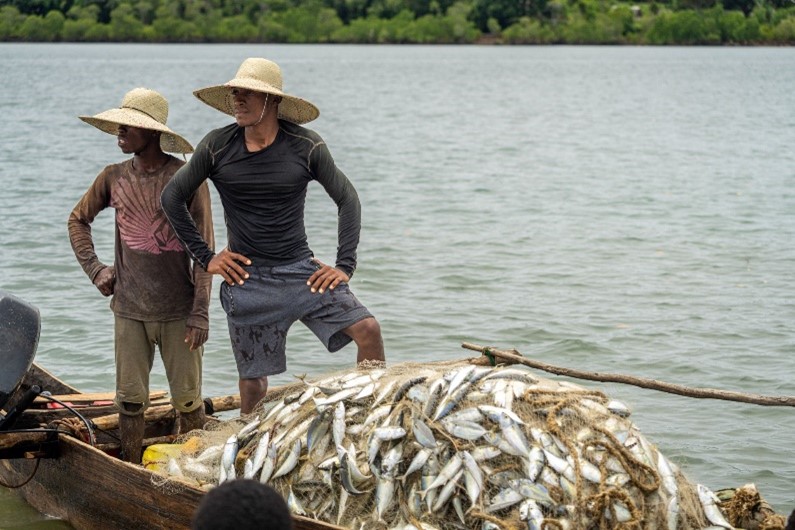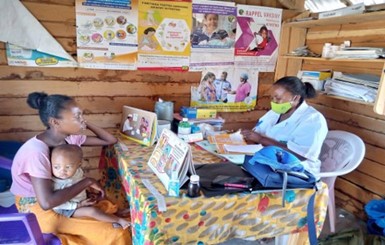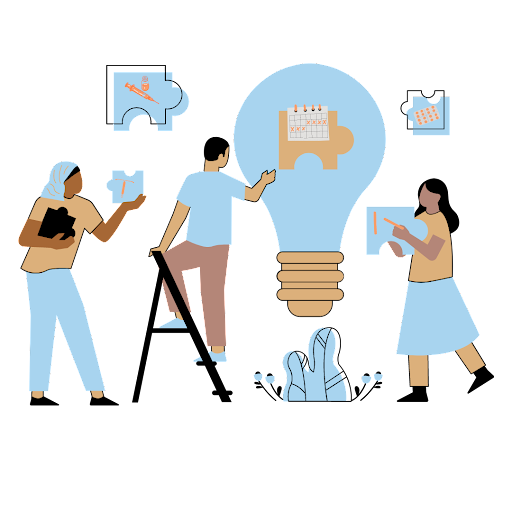Q&A
Reading Time: 6 minutes
Spotlight on People-Planet Connection: Edith Ngunjiri on Blue Ventures
Published on August 10, 2023

Can you briefly introduce yourself, including your position and organization?
My name is Edith Ngunjiri and I’m a public health specialist by profession with nearly ten years of experience. I joined Blue Ventures in 2021 as a technical advisor for Health and Environment (H-E) Partnerships. Blue Ventures is a marine conservation organization which works with communities to address both marine conservation issues as well as health issues. One of the ways we do this is by integrating health interventions within our marine conservation programs.
As a technical advisor, my role involves providing guidance on the implementation of our H-E programs across the four countries (Madagascar, Indonesia, India, and Mozambique) where we currently have H-E programs. We are working towards establishing partnerships in Kenya and we also support other organizations interested in implementing a health environment approach such as Future of Fish which is based in Peru.
What has steered you and your organization towards this cross sectoral approach to health and environment and development?
Blue Ventures started working with communities in marine conservation, focusing purely on fisheries and marine resource management. Later in 2007, we started integrating health interventions, addressing a huge unmet need for family planning. We came to understand that we were addressing a health need which is part of a broader ecosystem consisting of conservation, health, livelihood, and other challenges. From that understanding, we built an even bigger health and environment project.
By addressing that initial unmet need for family planning, we realized the need for support in other areas among them: water, sanitation and hygiene, maternal and child health, HIV services, and nutrition.
Can you speak about the importance of partnership in your work and describe what the process of working with partners looks like?
Partnership is a very important aspect of how Blue Ventures works. This is embedded into our 2025 strategy. Through our marine conservation work,we have identified health needs that communities need support with and because we are not a health organization, it’s very important for us to work in partnership with other health organizations. Partners such as the respective ministries of health have the expertise and capacity in the particular thematic areas that we aim to address..
We also support community health workers (CHWs) in the communities where Blue Ventures works and focus mainly on strengthening health systems as a sustainability measure. t’s easier to cultivate change while working within the embedded community structures.
Partnerships help us leverage technical expertise, foster sustainability measures and support organizations which are aligned to our values and vision. By doing this, we can reach more communities through more impactful interventions.
What is Blue Ventures’ process for engaging new partners and building partnerships?
We have a partner scoping process, which we are currently standardizing. It consists of a select criteria which we use when we want to start a partnership. One of the key things we look at are the values of the organization and if they align with Blue Ventures’ values. We also look at the organization’s capacity to undertake the proposed interventions or scope of work.
The other thing we look at is the organization’s level of expertise. For example, if it’s a health organization, this is guided by the community health need. For example, it could be water, sanitation, and hygiene and/or maternal and child health. We then look at the focus areas of this organization to see if they have previously undertaken similar kinds of work and their level of funding.
Once we have identified that the potential partner has the capacity, and is also well aligned in terms of values and objectives, we then start the preliminary processes of engagement which include meetings to discuss the community interventions, design and planning of the project.
What are some of the largest challenges you’re facing within your work in integrated health and environment programs and what has Blue Ventures done to address some of these challenges?
Scoping for an ideal partner is not an easy process. Sometimes you might find a very well aligned organization that does not have the capacity. Other times, an organization may shift their vision or their strategy, meaning that the dynamics upon which that partnership began have changed.
Another issue which is both a challenge and an opportunity is that a lot of organizations are used to working in silos. It takes a while before they can understand the concept of integrated programming. Questions on the likelihood of success in integrating health interventions and how to bring about change frequently arise. We hold meetings and discussions internally and whenever we identify a potential partner, we conduct a H-E cross-learning session – which is basically an introduction to integrated health-environment programming.
Quantifying or generating evidence to show people and explain with much better clarity the impact of H-E programmes can also be a challenge. We have our routine monitoring and evaluation processes but have some difficulties identifying indicators that relate to both health and environment. We have a very robust database with health data. Our theory of change of how we envision our health interventions contributing towards marine outcomes or impacts also focuses on community engagement which is not very easy to quantify.
Do you have any innovations in integrated health and environment work that your organization is developing or implementing or perhaps has done in the past?
To ensure continuity of our H-E program in Indonesia, we are embedding our Population Health-Environment (PHE) activities within local administration in the annual village development activity and budget plans. This is part of our advocacy efforts at the community level so that when Blue Ventures transitions or when we want to move over and support other communities, the local community and the local governments will have both the technical and financial capacity to continue implementing H-E activities.
We do a lot of work with women’s groups and youth groups. For the women’s groups, we have discussions on reproductive health and their importance and role in conservation. That is how we try to address and engage the community in both these aspects. For the youth groups, we work with them on advocacy and increasing awareness on sexual reproductive health, including HIV services. The community health workers also take part in marine conservation activities for example mangrove restoration.
What are some of Blue Ventures’ accomplishments over the years that you are most proud of?
I’m very proud of where we started and why we started and the impact that it has had on the community. For example, the contraceptive prevalence rate in the Velondriake region in Madagascar where we commenced integrating sexual and reproductive health (SRH) services increased from 25% to 59% within five years (2009-2013), coupled with a reduction in fertility rate by 28%. These results were obtained from surveys undertaken in 2009, 2011 and 2013 to assess changes in contraceptive use and fertility. By integrating SRH services, we were able to increase access to contraceptive services in such an underserved and remote community and therefore foster marine conservation activities.
We have a lot of testimonies from the community; men and women talking about how they are able to better access some of these services because of Blue Ventures. The women talk about how they have been able to space their births, giving them a better opportunity to plan their families and manage their income generating activities.
Generally, I’m proud of the overall impact that our H-E program has yielded in terms of health and livelihoods of communities in such remote and underserved areas.
To support the wider replication of the PHE model, Blue Ventures established the PHE Network which is playing a huge role in convening both conservation and health organizations and advocating for integrated PHE programming at the community, regional and national levels. As a semi-autonomous organization, we’ve been able to work with the network to increase our reach and build the capacity of more organizations for integrated PHE programming. It currently boasts a membership of about 60 organizations.
What are some important lessons you’ve learned through your experiences in cross sectoral work?
One of the key lessons that I’ve learned is that it’s very important to have a holistic perspective in our respective areas of work. I think a lot of programmes and organizations do not consider other issues from other sectors that could affect their sector, and which, if jointly addressed, would bring positive impact to both sectors. It’s vital to undertake PHE cross-training – bringing the conservation and health partners, government and the community in one room to discuss and explain the interlinkages within health-environment programming.
I’ve also learned that instead of saying it cannot work, try and measure to establish evidence that it actually doesn’t. At the end of the day, there would still be some positive impact, whether it’s on the health or conservation side. The other thing I’ve learned is the power of partnerships. They are very key.
Is there anything else that you wanted to share about your work, anything that you feel would be good to highlight?
We are continuously trying to refine our tools and our processes. I will highlight three tools key to our work that we have been working on. We’re trying to streamline our partner scoping process (which I have described above) by developing a standardized partner scoping tool.
We are also working on a ‘PHE partnership decision making tool’ which overlaps with the scoping tool in a few areas but whose main objective is to help us make the initial decision as to whether there is a need to undertake a H-E project. Some of the criteria we look at include the extent of the unmet health need and whether it might affect, in one way or the other, the communities’ resilience and ability to engage in conservation efforts. In this regard, we also assess the level to which we can meet this need and how we can involve other partners. Since this is a H-E project, we also assess the willingness and capacity of the conservation partner to collaborate with a health partner.
We’re also working on streamlining our data collection process and developing tools that will help us to get as much information as possible from the community through a health needs assessment tool. Basically, these tools would give us a better understanding of the health needs of the community and guide us through the partner scoping process.









